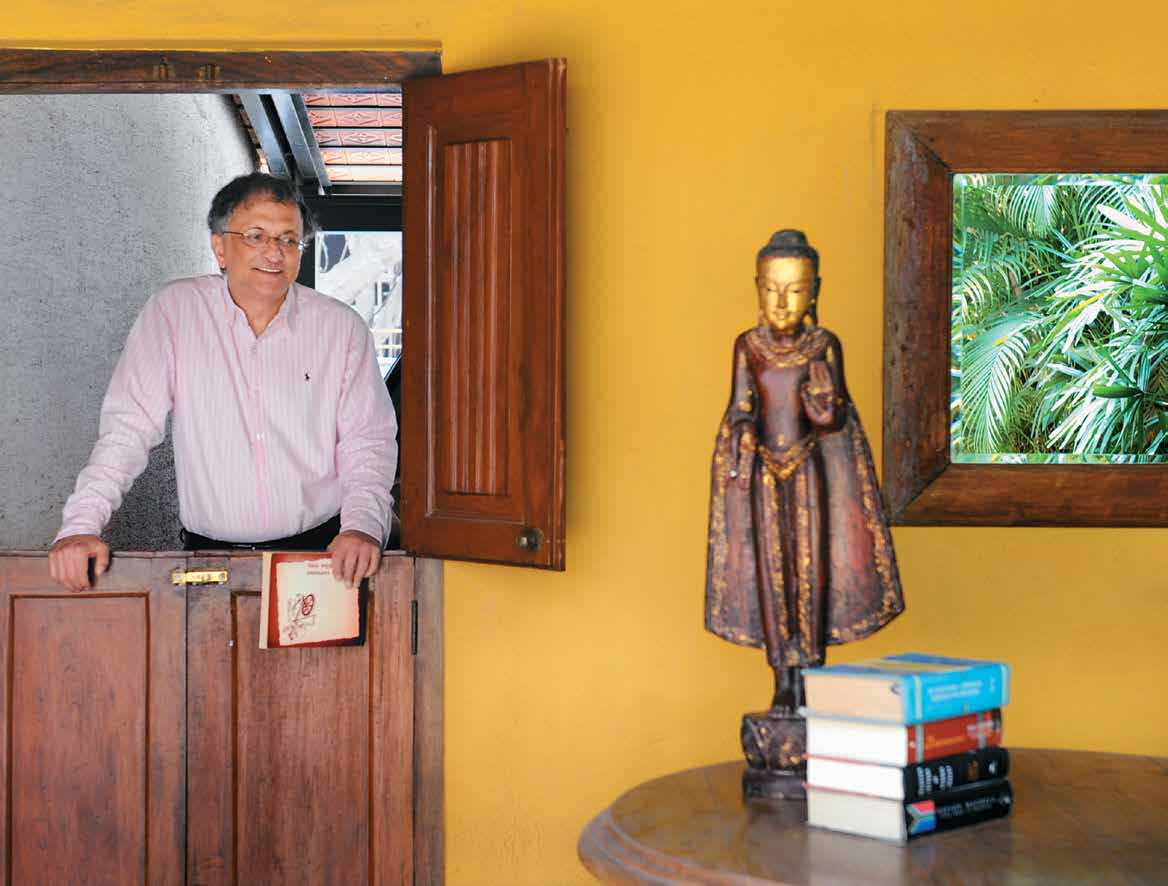Essayer OR - Gratuit
Editing A Writing Machine
Outlook
|April 09, 2018
The academic can complicate what seems simple even while simplifying the seemingly complex —that’s what made Ram Guha a pioneer of sorts as a writer of history.

IT may be best for me not to begin my recollections of Ramachandra Guha along the standard template that recommends the phrase “The first time I met...” The reason is that our first meeting was inconsequential. Apparently we met on a college badminton court 44 years ago, around July 1974. Since Ram didn’t go on from this badminton court to become Deepika Padukone’s father, this first encounter’s location, at least, was not an augury of the direction of Ram’s future fame.
I have no idea what Ram was doing near a badminton court in the mid-1970s because his interests lay in a corner of a different field, the cricket pitch. His agenda even then was anti-Hindutva, though it took a peculiar shape as it had got mixed up with his interest in cricket. His aim in those days was to disprove the Hindu idea of reincarnation by circumventing his own afterlife through becoming either Bishen Singh Bedi or Erapalli Prasanna in this life. Failing either of those two options, he seemed to have resig ned him self to a third, which was to become Gundappa Vishwanath.
Since I was not passionate about cricket, for the remainder of our college years Ram and I lived proximate lives without ever coming close. I knew roughly who he was, and I also knew precisely what ‘type’ he was—he was what was called in those days a ‘sports type’. This knowledge was a subconscious certainty somewhere inside me that if there was a fellow in our college who was never going to amount to anything intellectually, his name was Ram Guha. He would develop his muscles, grow into a hunk, even perhaps wear a turban, and the climax of his aspiration would be to draw Viv Richards out of the crease and bowl him round his legs. In short, to my mind Ram Guha was someone who could be safely written offand forgotten about.
Cette histoire est tirée de l'édition April 09, 2018 de Outlook.
Abonnez-vous à Magzter GOLD pour accéder à des milliers d'histoires premium sélectionnées et à plus de 9 000 magazines et journaux.
Déjà abonné ? Se connecter
PLUS D'HISTOIRES DE Outlook

Outlook
Harnessing AI for a Future-Ready India
Eminent leaders from government, industry, and academia deliberated and explored the various facets of Al's impact on education and societal progress, aligning with national goals. The future of education cannot be designed in silos. It must be co-created by governments that set direction, universities that nurture inquiry, industries that bring scale, and society that provides purpose.
1 mins
March 01, 2026
Outlook
Adrift Identities
The term 'ethnicity' has always been a murky concept for me. It would not be a stretch to claim that I have always felt considerably estranged from culture itself, like a balloon left adrift in the air, floating in limbo, unknowing of its origin and destination.
3 mins
March 01, 2026

Outlook
The Memory Keepers
A handful of media enterprises have worked hard to keep the Dalit diasporic community informed of their roots and responsibilities
5 mins
March 01, 2026

Outlook
Everyday Muslim
As Hindi cinema, by and large, continues to fail to create films depicting the regular life of an Indian Muslim sans stereotyping, The Great Shamsuddin Family comes as a breath of fresh air
6 mins
March 01, 2026

Outlook
Anatomy of a Horror
In September 2025, survivor Marina Lacerda stood before the US Capitol and spoke publicly about Jeffrey Epstein for the first time. Her story, along with the account of Haley Robson, echoed the trajectory of many other victims, revealing a pattern of grooming, coercion and silence that endured for decades, and raising uncomfortable questions about power, accountability and whether justice has truly been served to Epstein's victims
9 mins
March 01, 2026

Outlook
The Audience is Present
Marina Abramović's work is active, alive and pressingly contemporary. At an uncannily youthful 79, she exudes an intimidating calm, despite the brutal images she guided us through at her lecture on the history of performance art last week at the Kochi-Muziris Biennale-from live fireworks against a man's leg to an eyeball being sliced open
6 mins
March 01, 2026

Outlook
The Master Manipulator
As a perfect facilitator, Jeffrey Epstein extended the perks of his sociopathic zeal-the kind of fun suitable for the world of dark web-to his peers. He offered a glimpse into some of the world's bigwigs without their masks
9 mins
March 01, 2026

Outlook
The Woman with the Dragon Tattoo
Epstein survivor Virginia Giuffre's memoir was written in the hope of building a world where the powerful are held to account. It was published months after she died of suicide in 2025
5 mins
March 01, 2026

Outlook
Writing with Fire
The repeated, inhumane, and systematically careless violation of the basic tenet of universal value is what the Epstein files have made public
5 mins
March 01, 2026

Outlook
Teflon of Power
In the US, the Epstein disclosures have opened a window into the lives of the rich and the famous, but no action has been taken. In Europe, however, heads have rolled
7 mins
March 01, 2026
Translate
Change font size
